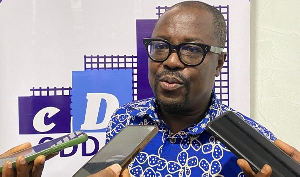 Professor George Owusu, Senior Lecturer at ISSER
Professor George Owusu, Senior Lecturer at ISSER
A study conducted by members of the Ghana Center for Democratic Development (CDD-Ghana), the London School of Economics, and the University of Ghana has shown that self-build housing contributes to job creation and helps expand the local economy.
A Senior Lecturer at the Institute of Statistical, Social and Economic Research (ISSER) at the University of Ghana, Professor George Owusu, stated that the research examined factors driving urbanisation in Ghana and Tanzania and how urbanisation contributes to employment and economic growth.
Speaking to the media on the sidelines of the Research Dissemination Workshop in Accra on Monday, May 26, 2025, Professor Owusu explained that individuals who build their own houses create employment opportunities for artisans, as they require skilled labor during construction.
“If you take a typical Ghanaian building a self-contained house, just look at the number of people involved, carpenters, masons, laborers, painters, tilers, and more,” he stated.
“Apart from that, they also buy building materials and demand services from architects, surveyors, and others. This generates a lot of economic activities and employment,” he added.
Challenges in self-build housing
Despite these benefits, the researchers also identified challenges, including urban sprawl and uncontrollable expansion.
According to the 2021 census, Ghana’s housing deficit remains a major issue. The country has over 5 million houses, but many remain unfinished or unaffordable for low-income earners.
The compound house, which has been a popular housing option for low-income earners, is also declining.
Call for policy interventions
The Senior Lecturer at ISSER emphasised the need for government and policymakers to improve urban planning and land-use systems to promote sustainable building practices that do not adversely impact the environment.
The research dissemination workshop brought together participants from government ministries, academia, local assemblies, and civil society organisations (CSOs).
SA/MA
